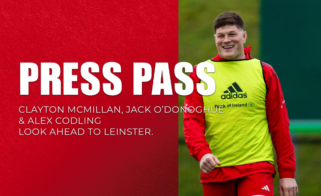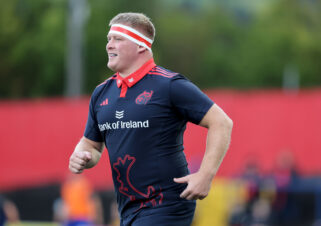Academy Mental Skills Modules – Part 1
5th February 2015 By Munster Rugby

Sports psychologist Tadgh MacIntyre provides an insight into the Mental Skills workshops conducted with members of the Greencore Munster Academy, discussing the rationale behind each approach and exercise, and their subsequent benefits to players.
A significant part of Tadgh’s work focuses on a practical project called ‘Mind Matters Resilience Training’. Designed to provide players with online training to supplement their mental skills, it affords young players psychological literacy and an understanding of how their mind works and how they operate as a team.
“Each participant has a player buddy – a team mate they can rely on. In rugby you are required to perform as a team, in units and sometimes as pairs and an individual. We use that dynamic as a turn-key to them learning new things and to help one another take on new challenges.
“Sometimes we do parings by position – half backs paired together, etc – and sometimes we do it by personality where someone who is strong in particular attributes works with someone who may not be as strong in those areas.”
The theories and strategies taught by Tadgh translate to three main areas for players – on the pitch, off the pitch in their study and work domain, and off the pitch in their personal lives.
“We’re looking at players being content within the bubble of rugby, but also having something strong and meaningful outside of that bubble.
“Outside the bubble, it’s really important for Academy players to have some form of career dimension – ideally at college as that connects them to others in their peer group outside of rugby circles. That way it’s less likely to feel isolated outside of the sport.
“Such connectivity should also have long term strategic value to them, so where they are doing a course that’s of interest to them and they are not just ticking boxes.”
The reality of professional sport is that players do and will get injured. Therefore, preparing Academy players mentally for recovery is another key component of Tadgh’s work, optimizing resilience and, in turn, recovery.
“This is perhaps the biggest hurdle many will face in their Academy and professional careers.
“We always make sure an injured player has a mentor, be it a Senior player or another Academy member who progressed quickly through an injury. They work together in twos and threes and become almost like a recovery club.
“This is another reason why it’s good to have other pursuits and interests outside of the bubble. If your source of confidence for being a person is based solely on scoring tries and clearing out rucks, etc, and suddenly you can’t do that for a number of months, then it becomes a dark world very fast.
“During their rehab, we buddy players up with someone outside the bubble to work on the career/college dimension, but we also give them another specific rugby skill to work on. For example, a prop that can’t scrummage due to injury. If he can work on something else like a fancy offload that might benefit his career down the line, even if injury progress is slow, developing his offloading skills will give him some feel-good.”
In Part 2 (next week), we look at the wide menu of practical exercises and strategies adopted by players during their day to day activities to complement their classroom training.



